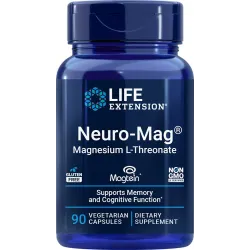Creatine Capsules
120 vegetarian capsules
Item Catalog Number: 01529

Creatine is naturally produced in the human body from amino acids L-arginine, glycine, and L-methionine primarily in the kidney and liver and transported in the blood to help supply energy to all cells in the body. Creatine is metabolized into phosphocreatine, an important storage form used by the brain, heart, and skeletal muscles.1-5 In normal healthy individuals, muscle creatine is replenished at a rate of approximately two grams a day.6
Creatine exerts various effects upon entering the muscle. It is these effects that elicit improvements in exercise performance and may be responsible for the improvements of muscle function and energy metabolism seen under certain conditions. Several mechanisms have been proposed to explain the increased exercise performance seen after creatine intake:7
- Optimizing energy metabolism by maintaining higher levels of the body's energy compound adenosine triphosphate or ATP.8-10
- Increasing myofibrillar mRNA content and protein synthesis, and reducing amino acid oxidation and protein break-down.7,11,12
- Increasing satellite cell and myonuclei number and activity in human skeletal muscle.13
- Inhibiting tissue damage by stabilizing cellular membranes and maintaining reserves of ATP.7
Interestingly, creatine may have the ability to ease inflammation, at least after exercise. One study found that “creatine supplementation reduced cell damage and eased inflammation after an exhaustive race.”1
Clinical trials have demonstrated creatine as having positive effects on strength and body composition and improving muscular performance in older adults, especially when combined with a resistance-training exercise protocol.14-17 Fourteen weeks of resistance training, done three days per week, resulted in significant increases in all measurements of strength and functional tasks and muscle fiber area for both the creatine and placebo groups.14 However, the group getting the creatine resulted in significantly greater increases in fat-free mass, greater increase in isometric knee extension, greater gains in isometric dorsiflexion strength, as well as a significant increase in intramuscular creatine levels.
One particularly interesting study found that the positive effects of creatine on strength and lean tissue in older adults continued after they stopped using creatine; at least for the duration of the study.17 The scientists concluded that "withdrawal from creatine had no effect on the rate of strength, endurance, and loss of lean tissue mass with twelve weeks of reduced-volume training."
The addition of creatine supplementation to an active lifestyle can provide added benefit to the health of the brain.18-23 One study found that creatine was very effective at reducing damage to brain tissue after injury. The researchers found that " … administration of creatine ameliorated the extent of cortical damage by as much as 36% in mice and 50% in rats. Protection seems to be related to creatine-induced maintenance of mitochondrial bioenergetics."24
Creatine monohydrate has become popular with athletes, but it may also be beneficial for people who are nutritionally deficient, have conditions associated with low cellular energy, muscle weakness, and those concerned with the muscular integrity of the heart.23,25-36
Each creatine capsule supplies 500 mg of easily-absorbed creatine monohydrate.
Supplement Facts
Serving Size 2 vegetarian capsules
Servings Per Container 60
| Amount Per Serving |
|---|
| Vitamin C (as ascorbyl palmitate) |
11 mg |
| Creatine monohydrate |
1000 mg |
| Other ingredients: vegetable cellulose (capsule), stearic acid, silica |
Non-GMO
Dosage and Use
Take two (2) capsules twice daily with water or juice, or as recommended by a healthcare practitioner.
Caution
Those with impaired kidney function should avoid creatine supplements.
Warnings
KEEP OUT OF REACH OF CHILDREN
DO NOT EXCEED RECOMMENDED DOSE
Do not purchase if outer seal is broken or damaged.
When using nutritional supplements, please consult with your physician if you are undergoing treatment for a medical condition or if you are pregnant or lactating.
- Life Sci. 2004 Sep 3;75(16):1917-24.
- J Physiol. 2001 Oct 15;536(Pt 2):625-33.
- Sports Med. 2002;32(14):903-44.
- Sports Med. 2005;35(2):107-25.
- Brain Res. 2009 Aug 18;1285:158-63.
- Adv. Enzymol Relat Areas Mol Biol. 1979;50:177-242.
- Pharmacol Rev. 2001 Jun;53(2):161-76.
- J. Nutr Biochem. 1997; 8(11): 610-618.
- J Pharmacol Sci. 2003 Apr;91(4):277-84.
- Mol Cell Biochem. 2008 Nov;318(1-2):147-65.
- Med Sci Sports Exerc. 2001 Oct;33(10):1674-81.
- J Appl Physiol 2001;91: 1041–1047.
- J Physiol 2006;573: 525–534
- J Gerontol A Biol Sci Med Sci. 2003 Jan;58(1):11-9.
- Med Sci Sports Exerc. 2007 Nov;39(11):1960-8.
- Eur J Appl Physiol. 2008 Jan;102(2):223-31
- J Aging Phys Act. 2004 Jul;12(3):219-31.
- Nutrients. 2011 Aug;3(8):735-55.
- Med Res Rev. 2013 Mar;33(2):336-63.
- Ross Fiziol Zh Im I M Sechenova. 2011 Jul;97(7):708-17.
- J Neurosci Res. 2012 Feb;90(2):435-46.
- Curr Alzheimer Res. 2011 Dec 1;8(8):868-75.
- Amino Acids. 2011 May;40(5):1305-13.
- Ann Neurol. 2000 Nov;48(5):723-9.
- Eur J Appl Physiol. 2011 Sep;111(9):1965-71.
- Amino Acids. 2011 May;40(5):1397-407
- Amino Acids. 2010 Jan;38(1):31-44.
- Altern Med Rev. 2007 Sep;12(3):246-58.
- Cochrane Database Syst Rev. 2007 Jan 24;(1):CD004760.
- CNS Drugs. 2004;18(14):967-80.
- Neuromolecular Med. 2008;10(4):275-90.
- Amino Acids. 2011 May;40(5):1385-96.
- Amino Acids. 2011 May;40(5):1315-24
- J Neurochem. 2004 Feb;88(3):576-82.
- Pharmazie. 2006 Mar;61(3):218-22.
- Amino Acids. 2011 May;40(5):1349-62.


 Creatine is naturally produced in the human body from amino acids L-arginine, glycine, and L-methionine primarily in the kidney and liver and transported in the blood to help supply energy to all cells in the body. Creatine is metabolized into phosphocreatine, an important storage form used by the brain, heart, and skeletal muscles.1-5 In normal healthy individuals, muscle creatine is replenished at a rate of approximately two grams a day.6
Creatine is naturally produced in the human body from amino acids L-arginine, glycine, and L-methionine primarily in the kidney and liver and transported in the blood to help supply energy to all cells in the body. Creatine is metabolized into phosphocreatine, an important storage form used by the brain, heart, and skeletal muscles.1-5 In normal healthy individuals, muscle creatine is replenished at a rate of approximately two grams a day.6